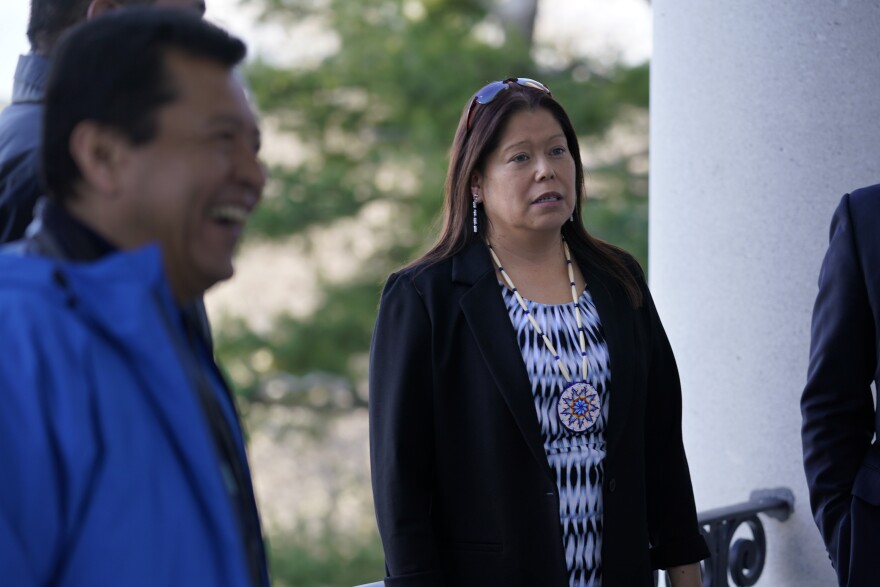Gov. Janet Mills wants Congress to delay acting on a bill intended to give Wabanaki tribes in Maine access to future federal rights and protections that other tribes enjoy.
Under terms of the 1980 Land Claims Settlement Act, the Wabanaki are currently excluded from beneficial laws and protections that apply to most other federally-recognized tribes.
A bill sponsored by Rep. Jared Golden would change that, at least going forward.
Golden's bill advanced in the House Natural Resources Committee last month, the first of many hurdles needed to move the legislation through Congress and into law. The legislation is also part of a House draft of next year's federal interior budget.
But Gerald Reid, the governor's top attorney, wrote to leaders on the House Appropriations Committee last week, asking that they defer action on Golden's bill until the state and tribes have negotiated their own compromise.
The letter was first reported by the Bangor Daily News.
"The governor does not want to see the Wabanaki Nations unfairly excluded from certain benefits that are generally available to federally-recognized tribes, and she believes there is potential for negotiated agreement that would address this concern," the letter reads. "To that end, I am now actively discussing the potential for such an agreement with tribal representatives."
The letter also included testimony that Reid first provided to Congress back in April, which laid out the state's concerns with the federal bill, known as the Advancing Equality for Wabanaki Nations Act.
Mills, tribal leaders and state lawmakers spent much of this year's special legislative session considering an array of tribal bills. The governor signed two separate measures earlier this year, one that granted Maine tribes the exclusive right to offer online sports betting, and another intended to help the Passamaquoddy tribe resolve water quality issues on their land.
But a broad overhaul of the 1980 settlement act never made it out of the legislature, over fears of a potential veto from Mills. Maine's tribes acknowledged progress had been made but vowed to continue their push for sovereignty.
Spokeswoman Lindsay Crete pointed to a statement that Mills made back in April, which said she believed progress could be made on Golden's bill. The governor is currently negotiating with Maine tribes and simply wants Congress to allow time for those discussions to continue, Crete added.
But Golden, in his own statement, said the question of whether future federal laws should apply to tribes, including those in Maine, is one "squarely" one for Congress to consider — and doesn't require the state's approval.
"The state has had ample time and opportunity to provide productive suggestions over the past five months," Golden said. "Although they have alluded to a willingness to pursue a compromise with the tribes, I understand little progress has been made thus far. While we welcome good-faith efforts to improve the legislation, we will not slow our forward momentum in advancing a bill on which Congress has the principal authority."
Tribal attorneys are discussing the legislation, which has backing from the U.S. Interior Department, with the governor's office, Chief Kirk Francis of the Penobscot Nation confirmed.
"But I am concerned that those discussions are not happening often enough and are not resulting in any meaningful progress towards compromise," he said. "We want to try to address any reasonable concerns raised by the governor, but the current practice of allowing the state to essentially block the application of any federal law intended to benefit tribal governments is nonsensical and harms both tribal communities and the nearby non-tribal communities."
Rep. Chellie Pingree of Maine's first district has seen the letter, a spokeswoman for her office confirmed. Pingree leads the interior budget-writing panel in the House, and in statement, said she "felt it was important to include language that puts us further down the path to fixing the disparity that has uniquely challenged Maine’s tribes for decades.”
If a bill were to advance through the regular Senate process, Sen. Susan Collins will "consider it carefully" and listen to both opponents and advocates for the proposal, said Annie Clark, the Republican senator's spokeswoman.
Sen. Angus King is speaking with stakeholders and is still evaluating whether he'll introduce or support such a measure, a spokesman for the Independent senator said Friday.
Francis said the tribe will work with the federal government and Maine's congressional delegation in the coming weeks, with the goal of passing a bill by the end of this year.
Copyright 2022 Maine Public. To see more, visit Maine Public. 9(MDIxMDkyNjUxMDE0NDY1Njg1NzRiOTRiYQ000))




